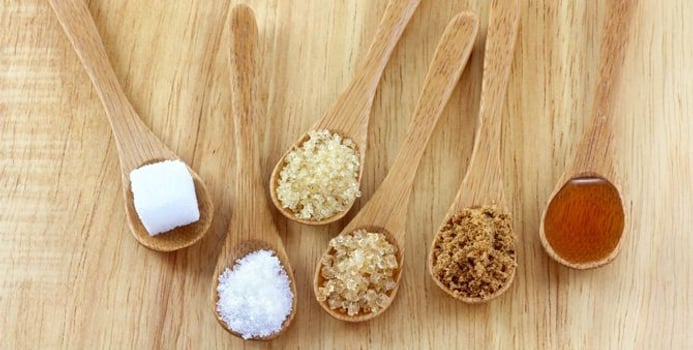The Dietary Guidelines for Americans (2010) and the American Heart Association (2009) recommend to "reduce intake of added sugars," without singling out any particular types, such as sugar or honey. When food companies want to entice consumers to buy their sweetened products, they like to use phrases like "honey sweetened" as a selling point. In most consumer's minds, honey is a healthier alternative to sugar because it is more natural. However, "natural" is not always synonymous with "healthy."
The Basics
Your body breaks down food into glucose, its main source of fuel. White sugar is comprised of about 50 percent glucose and 50 percent fructose, the sugar that is typically found in fruits. These sugars are usually found bound together, making the molecule sucrose. Overall, it is broken down very easily, leading to a big surge in blood glucose. One tablespoon of sugar yields about 49 calories and about 15 grams of carbohydrate.
Honey is also mostly sugar, but is only about 30 percent glucose and less than 40 percent fructose. Unlike sugar, these are typically found in the free form, meaning honey is digested a little differently than white sugar. The rest of honey is mainly comprised of about 20 other sugars, some of which are much more complex, and dextrin, a type of starchy fiber. Honey, which is a little denser than sugar, contains about 68 calories and 17.2 grams of carbohydrate per tablespoon. However, because of the fact that fructose is sweeter than glucose, and the molecules are not bound up as sucrose, honey tastes sweeter. Because of this, people often use less of it, negating the slight difference in calories.
Other Possible Benefits of Honey
Both honey and granulated sugar come from natural sources. However, honey, which is sold either raw or pasteurized, undergoes much less processing. In the formation of granulated sugar, any vitamins and minerals in the original sugar cane or sugar beet are stripped away, leaving sugar as empty calories. Honey does contain small amounts of antioxidants and some trace elements. While the presence of these trace minerals and vitamins may be viewed as a slight advantage, the values are so low that honey cannot be considered a source of nutrients. For example, you would need a staggering 40 cups of honey in order to reach your daily iron requirements.
The Bottom Line
As with anything sweet, it is easy to overdo it. No matter what satisfies your sweet tooth, it should be consumed in limited amounts. While honey may have a slight edge, excessive consumption of either honey or sugar is a bigger danger to your health than the advantage you would get in choosing one over the other.
Sarah Dreifke is a freelance writer based in DeKalb, IL with a passion for nutrition education and the prevention of chronic disease. She holds a Bachelor of Science in both Dietetics and Life Sciences Communication from the University of Wisconsin-Madison. Currently, she is working towards a combined Master's Degree in Nutrition and Dietetics as well as a dietetic internship at Northern Illinois University.




